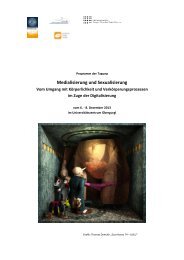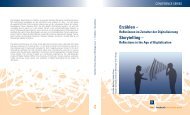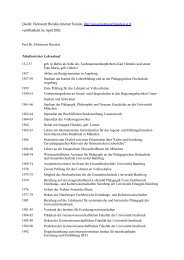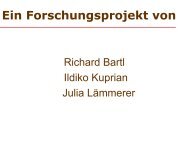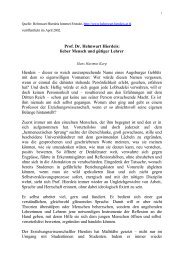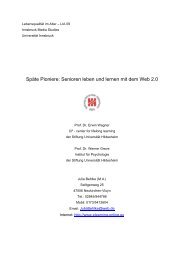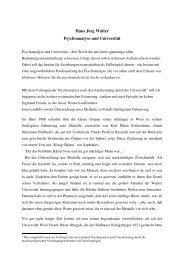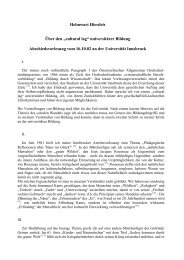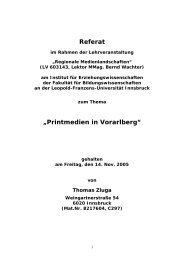Download pdf - Universität Innsbruck
Download pdf - Universität Innsbruck
Download pdf - Universität Innsbruck
Sie wollen auch ein ePaper? Erhöhen Sie die Reichweite Ihrer Titel.
YUMPU macht aus Druck-PDFs automatisch weboptimierte ePaper, die Google liebt.
26 Volker Grassmuck<br />
Ken Thompson and Dennis Ritchie who also passed away recently. Before divestiture of<br />
the telecommunications monopoly, Unix was shared freely with academia, and many researchers<br />
contributed to it. Afterwards AT&T's software lab was able to commercialize<br />
Unix. All mainframe makers licensed and extended it, in no time leading to dozens of<br />
mutually incompatible Unices.<br />
We would still be in this balkanized world today, had it not been for one hacker who at the<br />
MIT had experienced what the sharing spirit among a community of peers can achieve and<br />
stubbornly refused to let this go to the ruins of business plans and non-disclosure contracts.<br />
Richard Stallman in 1983 single-handedly undertook to reverse-engineer Unix in<br />
what he called the GNU project. In addition, he hacked the copyright system to ensure that<br />
his Unix would remain free forever, free to share and build on. His GNU General Public<br />
Licence (GPL) enshrines all of Merton's freedoms and stipulates the requirement to share<br />
derivative works back into the software commons. Strangely enough, it does not require<br />
attribution, but that is anyway common practice in free software projects. The GPL looks<br />
like a copyright licence, and technically it is, but its meaning is a social contract that creates<br />
a commons.<br />
The Sharing Turn<br />
What is the range of practices and movements in which the paradigmatic shift manifests<br />
itself? Tomasello's simple classification of objects of sharing may serve us to group them:<br />
information, services and resources.<br />
Information sharing is the purpose of information and communication technology. Even in<br />
the pre-Internet age, time-sharing operating systems introduced in the 1960s enabled people<br />
connected to the same mainframe computer to share anything from academic papers to<br />
recipes and science-fiction commentary. Still before the Internet proper, with the storeand-forward<br />
Usenet, these exchanges became global and their diversity exploded. The Internet<br />
then enabled the Open Access (OA) academic publishing movement as a response<br />
to the journal crisis (s. Guédon, 2001), with the high energy physics pre-print repository<br />
arXiv.org launched in 1991 as an early watershed.<br />
Since the Internet allows not only broadcasting of information as is, but two-way and<br />
group communications it encourages cooperations in which participants share their expertise,<br />
knowledge and skills in jointly creating new informational goods. Free Software, as<br />
mentioned, was the first practice that brought this trend to the public's attention. Benkler<br />
(2002) conceptualized it as part of a much broader social-economic phenomenon: The<br />
emergence of a new, third mode of production in the digitally networked environment that<br />
he termed “commons-based peer-production”, to distinguish it from the property- and<br />
contract-based models of firms and markets. Participants work together as equals (which<br />
does not preclude a meritocratic social differentiation), and they ensure the sustenance of<br />
their cooperation by releasing their common work under a free licence. Wikipedia is an-



